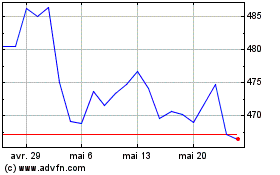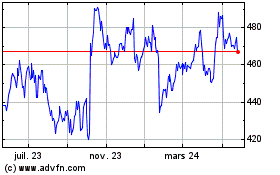By Doug Cameron
Controversy surrounding the suspected killing of journalist
Jamal Khashoggi is unlikely to derail the multibillion-dollar
relationship that makes Saudi Arabia a top customer of U.S. defense
firms, said industry executives and analysts.
The U.S. and Saudi Arabian governments have a long record of
negotiating contracts that can take years to reach fruition.
President Trump last year heralded nearly $110 billion in potential
deals during a trip to Saudi Arabia in May 2017. Many defense
analysts said that figure includes existing commitments and
contracts that could last as long as 30 years.
Mr. Trump has resisted calls to curb U.S. arms sales to Saudi
Arabia after Turkish officials alleged the kingdom killed Mr.
Khashoggi, a Saudi government critic, in its Istanbul consulate on
Oct. 2. Mr Trump said the planned deals are vital for American
companies and jobs.
The big five U.S. defense companies -- Lockheed Martin Corp.,
Raytheon Co., Boeing Co., Northrop Grumman Corp. and General
Dynamics Corp. -- all report earnings next week. Analysts are
expected to ask executives how the circumstances of Mr. Khashoggi's
disappearance might affect their business. Few expect them to
address the matter directly. All of the companies declined comment
for this story.
"We continue to believe that the death of Jamal Khashoggi will
not lead to a major break in U.S. or European defense sales to
Saudi Arabia," said Byron Callan at Capital Alpha LLC. Mr. Callan
estimated that Saudi Arabia accounts for about 5% of sales at the
big U.S. defense companies.
The specialized nature of weapons and defense systems from
companies such as Boeing, Lockheed Martin and Raytheon make them a
preferred supplier to the oil-rich monarchy, industry executives
and analysts said.
The U.S. and Saudi defense industries are becoming increasingly
intertwined, with American companies establishing joint ventures in
the Kingdom to make parts or providing repair services.
Saudi Arabia is the world's third-largest defense market after
the U.S. and China and the biggest export destination for U.S.
contractors, which made more than $3 billion in sales to the
kingdom last year, according to U.S. government data.
The biggest signed deal is a $10 billion purchase agreed in 2014
of hundreds of armored vehicles by a Canadian subsidiary of General
Dynamics, which is continuing to make shipments.
Canadian Foreign Affairs Minister Chrystia Freeland on Monday
said her country has no plans to cancel the deal, which was
approved by the previous Conservative government. The government
has proposed legislation that would toughen rules on future arms
sales, she said.
"When it comes to existing contracts, our government believes
strongly that Canada's word has to matter," Ms. Freeland said.
"Having said that, we believe in a tough arms export regime and
that is the approach we're taking going forward."
U.S. defense companies have fostered close relations with Saudi
leaders for decades. The kingdom's wealth and longstanding tensions
with Iran led it to plan to purchase best-in-class capabilities
such as Lockheed's Thaad missile-defense system. Lockheed has
previously said it hopes to close that deal by the end of the
year.
Saudi Arabia has also bought precision bombs and missiles,
though some U.S. lawmakers are seeking to block further shipments
because of their use in Yemen, which has resulted in thousands of
civilian casualties. Congress has required the Pentagon to assess
whether U.S. allies fighting in Yemen have violated human
rights.
Ties between the U.S. and Saudi Arabia have withstood previous
challenges, including the steep fall in oil prices in 2014 that has
strained Saudi Arabia's budget. Oil revenue is the overwhelming
driver of Saudi Arabia's economy and public spending.
Defense executives were among prominent attendees lined up for
the Future Investment Initiative conference in capital Riyadh next
week. A number of executives from finance and industry have pulled
out of the conference.
Raytheon Chief Executive Tom Kennedy is still listed as a
speaker on the official event website. Raytheon declined
comment.
Marc Allen, head of Boeing International, was a speaker at the
Saudi event last year and is also on the board of the U.S.-Saudi
Business Council, a business lobby group, alongside executives from
other big Pentagon contractors, such as Jacob Engineering Inc.
Lockheed Martin CEO Marillyn Hewson in April hosted a tour of a
U.S. satellite and missile facility by Crown Prince Mohammed bin
Salman, heir to the Saudi throne and the kingdom's day-to-day
ruler.
Boeing CEO Dennis Muilenburg in March hosted the prince at the
plane maker's plant in Seattle. Other executives, including Mr.
Kennedy at Raytheon, have talked of frequent trips to the
kingdom.
Saudi Arabia's huge arms bill has led the country to push for a
greater share of the economic benefits, especially jobs. The
kingdom has said it wants to become less reliant on imports and
spend half its weapons budget in domestic facilities -- compared to
just 2% at present -- part of a plan to diversify its economy
beyond the oil industry by 2030.
That has led U.S. companies to open Saudi subsidiaries and to
agree to shift assembly and other production processes to the
kingdom. Boeing announced a joint venture in March that would place
more than half the repair work for Saudi helicopters in the
country, creating 6,000 jobs.
BAE Systems plc, Europe's largest weapons maker with deep ties
to Saudi Arabia, is expected to have representatives at the
business conclave in Saudi next week, a person familiar with the
company's plans said. Saudi Arabia this year agreed to buy 48 more
Eurofighter Typhoons from BAE Systems, though the contract still
has to be finalized. It could see assembly of the planes in Saudi
Arabia.
Robert Stallard, an analyst at Vertical Research, said the
signing of the multibillion-dollar combat jet deal could be
delayed. He said, though, long-term BAE's business would not be
dented. "We think the Saudi situation will blow over," he said in a
note.
Write to Doug Cameron at doug.cameron@wsj.com
(END) Dow Jones Newswires
October 18, 2018 14:40 ET (18:40 GMT)
Copyright (c) 2018 Dow Jones & Company, Inc.
Northrop Grumman (NYSE:NOC)
Graphique Historique de l'Action
De Juin 2024 à Juil 2024

Northrop Grumman (NYSE:NOC)
Graphique Historique de l'Action
De Juil 2023 à Juil 2024
